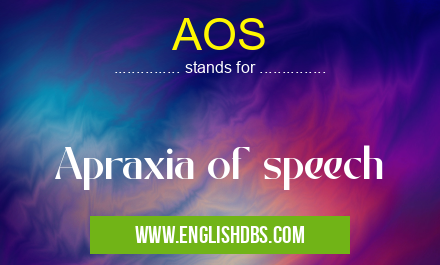What does AOS mean in CLINICAL MEDICINE
AOS stands for apraxia of speech, which is a neurological speech disorder that affects the ability to plan and coordinate the muscles and movements required for speech. It's also known as verbal apraxia or acquired apraxia of speech (AOS). Apraxia of speech can happen in children who are still learning language skills, but it usually impacts adults. Apraxia of speech usually occurs as a result of damage to the brain due to stroke, traumatic brain injury (TBI), or other degenerative neurological conditions such as Parkinson's disease or multiple sclerosis.

AOS meaning in Clinical Medicine in Medical
AOS mostly used in an acronym Clinical Medicine in Category Medical that means Apraxia of speech
Shorthand: AOS,
Full Form: Apraxia of speech
For more information of "Apraxia of speech", see the section below.
What AOS Means
Apraxia of speech is an inability to correctly produce sounds, syllables, and words despite having normal comprehension and normal motor activity. It is important to note that people with apraxia of speech may have difficulty saying some words more than others. This means that their ability to produce certain sounds varies from time to time, depending on how hard they have to concentrate. People with AOS may also struggle with facial expressions and gestures related to expressive communication.
Causes Of AOS
The exact cause of AOS is unknown but it often occurs as a result of head trauma, stroke, or neurodegenerative diseases like Alzheimer’s disease or Parkinson’s disease. Damage to the parts of the brain responsible for producing language can lead to difficulties with language production and AOS is one possible outcome. Other factors such as genetic predisposition, exposure to toxins in early childhood development, and certain health conditions can also lead to AOS.
Symptoms Of AOS
People with AOS will typically experience difficulty coordinating the muscles needed for producing sounds when speaking which leads them to make a variety of errors including distortions in sound production, mispronunciation of words, or frequent pauses while speaking due lack of coordination between mouth movements and articulating ideas. Other symptoms include limited range of facial expressions used in communication such as smiles or frowns; difficulty stringing words together into meaningful sentences; repeating certain phrases multiple times; resorting more often than usual on non-verbal methods like pointing towards objects rather than verbalizing ideas; forgetting previously learned words or making up new ones when unable to recall correct word.
Diagnosis Of AOS
The diagnosis process includes comprehensive physical examination including detailed medical history and evaluation tests like magnetic resonance imaging (MRI) scan. The initial step is identifying any motor impairments caused by stroke/trauma which affect your ability to communicate verbally followed by assessment tools used in general language evaluations such as receptive language tasks which measure your comprehension level and expressive language tasks which measure your oral production skills. These tests help diagnose language disorders like dysarthria & Aphasia besides determining if you have any cognitive issues affecting your planning & sequencing abilities need for accurately forming sentences.
Treatment For AOS
Treatment typically involves working with a trained Speech-Language Pathologist who can design an individualized therapy program tailored according specific goals based on your needs & current abilities. This program involves various verbal therapies that target improving vocal control over articulators like lips & tongue; building strength & coordination among oral muscles used during speaking ; practicing pronunciation drills involving reading aloud from text; engaging in interactive game activities ; learning sign languages; exploring emotional expression techniques such as music therapy, visual fronting boards for enhancing understanding & retention among others.
Essential Questions and Answers on Apraxia of speech in "MEDICAL»CLINICAL"
What is Apraxia of Speech (AOS)?
Apraxia of Speech (AOS) is a motor speech disorder that affects the ability to speak clearly and fluently. People with AOS have difficulty coordinating their muscles for speech, resulting in problems with pronunciation, articulation, and voice production.
Who can be affected by AOS?
AOS can affect people of any age, gender, race or socio-economic background. It is most commonly seen in children but can occur in adults as well.
What are the symptoms of AOS?
Symptoms of AOS vary from person to person but typically include difficulty producing individual words and sentences, mispronunciation of sounds or syllables, inconsistent intonation or stress on syllables and lengthy pauses between words.
What causes AOS?
The exact cause of AOS is not always known but it has been linked to brain injury, stroke, neurodegenerative diseases and other neurological disorders.
Is there a cure for AOS?
There is no single cure for AOS but intensive speech therapy can significantly improve communication skills over time. Other therapies such as medications and sensory integration techniques may also be helpful in managing the symptoms associated with the disorder.
How do I know if my child has AOS?
If you suspect your child has AOS, it's important that you seek an evaluation by a qualified medical professional such as a speech-language pathologist or neurologist. They will assess your child's communication abilities and provide an accurate diagnosis based on their findings.
Final Words:
Apraxia of Speech (AOS) is a neurological speech disorder resulting from an injury of motor-related areas within central nervous system causing difficulty in planning & executing movement patterns needed for producing meaningful sentences while speaking. Despite being rare condition, its difficult signs & symtpoms present considerable challenges for people affected by this disorder leading them long-term treatments managed by qualified professionals experienced in dealing with this population so they can improve their communicative capabilities.
AOS also stands for: |
|
| All stands for AOS |
